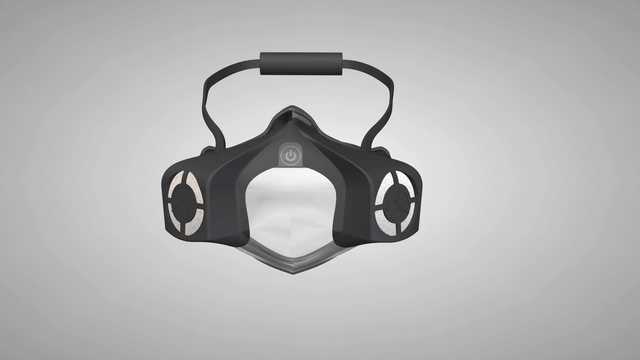Some of the most common objections to wearing face masks during the COVID-19 pandemic include an uncomfortable fit, difficulty breathing, and moisture buildup that causes glasses to fog. A team at Keck Graduate Institute (KGI)'s Medical Device Development Bootcamp (MDD), a summer program for undergraduate students, designed a user-friendly mask that would answer these objections and more.
Organized by Dr. Anna Hickerson, director of KGI's Master of Science in Medical Device Engineering program, MDD focused on medical devices and diagnostics for the detection, prevention, and treatment of COVID-19. Students were placed in teams with faculty advisors to design a product that solves an unmet pandemic need.
The InvisiBreeze mask, designed by Keona Banks, Jeremiah Egolf, Manuel Faria, Stefan Lutschg, and Jenny Xu, uses powered airflow through filters, which results in less strenuous breathing and reduces the possibility of CO2 buildup inside the mask. The team will be entering the mask in the XPRIZE Competition, which is geared toward designing a mask that addresses some of the top reasons why people do not wear a mask.
Other features of the InvisiBreeze mask include a face seal made of a flexible silicone material which prevents potentially contaminated air from circumventing the filters, a clear forward-facing portion to enable visualization of facial expressions and speech, and a phone app to track local air quality, filter lifetime, and battery usage. The mask is designed to be reusable and cleanable, integrated with replaceable filters.

Each team member brought their individual strengths to the table. Banks, a Mechanical Engineering major and rising junior at the University of Alabama in Huntsville, kept everyone organized and undertook the CAD rendering and material research.
"Manuel and I spearheaded the front-end, designing the aesthetic and how the customer interacts with the product," said Egolf, a Biomedical Engineering major and rising sophomore at Vanderbilt.
Lutschg, a rising junior and Biomedical Engineering student at Boston University, and Xu, a rising senior majoring in Electrical Engineering at Case Western Reserve University, were both involved with the circuitry and electrical components of the project.
"Jenny was more responsible for finding parts later, and I was more concerned with designing the circuit and doing the coding for the Arduino board," Lutschg said.
Xu's area of study gave her insights into what components they could realistically acquire.
"For example, we needed to find a way of boosting voltage, and I remembered some of the ways that we could boost voltage in school," Xu said. "I used the experience from different circuits that I previously designed to help me in creating parts or finding components for our circuit."
One of the challenges was finishing the project within a tight timeframe.
"We had to work ahead of the deadline to make sure we could complete the project and bring it to fruition prior to starting school," said Faria, a Neuroscience major and rising sophomore at Miami Dade College. "Also, part of the challenge is to make it appealing for people but also very functional and still relatively lightweight and wearable."
Additionally, the team had to overcome a steep learning curve.
"We definitely had to learn a lot of new things because this is a completely independent group," Banks said. "We didn't have many professors that could just answer our questions. We researched and learned more about circuitry, airflow, and how to develop an app and render a product to get to our end goal."
Overall, the students found KGI’s MDD summer program to be an enriching experience.
"I learned a lot of stuff that I wouldn't have learned until my senior year in a BME program," Egolf said.
"It was really eye-opening to learn all these different rules and regulations that apply ubiquitously to all medical devices."
Lutschg also enjoyed this aspect of the program.
"My biggest takeaway, besides learning more about hard skills like CAD and Arduino in circuit design, was definitely all the regulatory aspects, especially when dealing with the Food and Drug Administration here in the United States," Lutschg said.
The InvisiBreeze team was the youngest at MDD and excited to spend their summer exploring advanced concepts.
"The boot camp has gone way further than any of us thought it would," Banks said.
